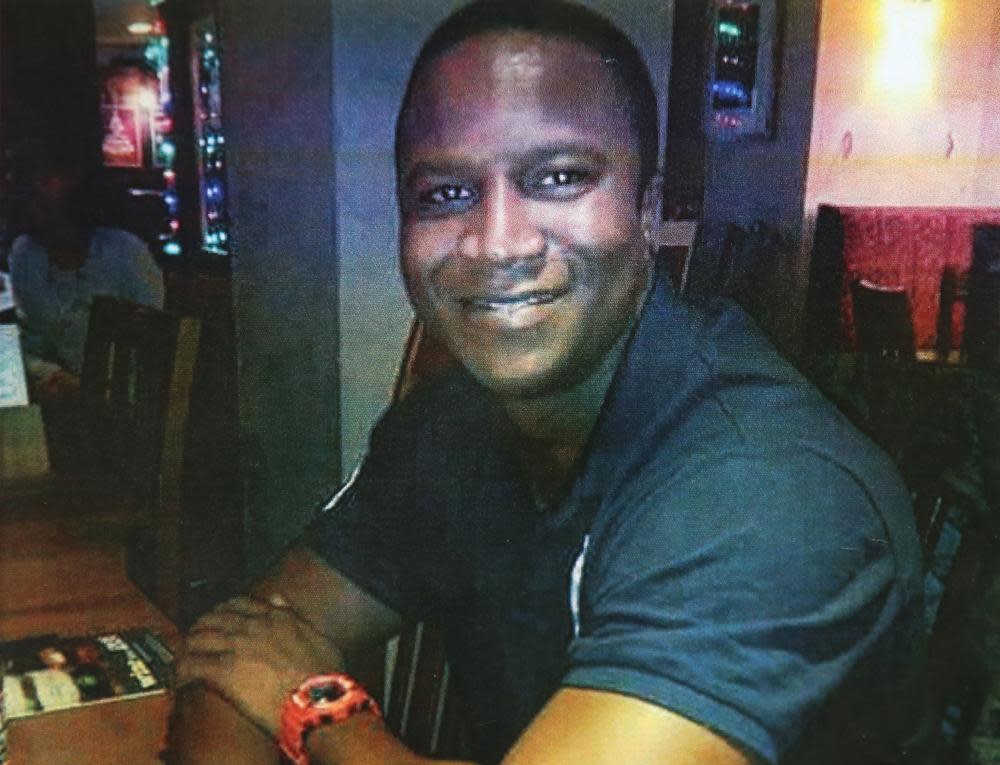‘Our brother shouldn’t have died like this,’ say Sheku Bayoh’s family

It’s been four and a half years since Sheku Bayoh died in Scottish police custody and now, for the first time, his family is allowing itself to hope they will get some answers. “My brother was a much-loved father and family man and a well-liked member of his community,” said Kadijatu Johnson, Bayoh’s sister. “He didn’t deserve to die like this, and we as a family deserved better than to be treated in the way that we have been.”
Last week, after Scotland’s lord advocate confirmed that no charges would be brought against any of the nine police officers the family believe were involved, the Scottish government announced a rare, judge-led public inquiry into the circumstances surrounding Bayoh’s death. A 31-year-old trainee gas engineer and father-of-two with no previous history of violence, Bayoh had arrived in Scotland from Sierra Leone as a young teenager and had moved to Kirkcaldy in Fife to live with his sister. On 3 May, 2015, he died after being restrained by police officers in his hometown.
The government’s move has made Scottish legal history; this will be the first public inquiry into events surrounding an individual, rather than several people.
“Our family are hoping for many things from this public inquiry, but the most important is to recover his reputation after the disgusting and wicked things that have been said about him after his violent death,” said Johnson. “We also hope that the person who spread these malicious claims will be revealed and held accountable. We believe there has been a fundamental breakdown of the Scottish justice system apparent in what we as a family have experienced and in the length of time it has taken to investigate the causes of Sheku’s death.”
The truth of what caused Bayoh’s death has never been fully established. His family were told that on the morning of his death police had responded to calls from members of the public concerned that a man was walking down the street brandishing a large knife. Two police vans, three marked police cars and one unmarked car went to the scene, and a minimum of nine uniformed police officers attended.
His family were lied to as the police also attempted to build a terrorism narrative
Aamer Anwar, lawyer
Bayoh had visited a friend to watch a boxing match. There, he had taken the drugs MDMA and flakka, which might explain his behaviour, which his family say was uncharacteristically erratic. He later left his home and neighbours called the police, with eye-witnesses saying he had a knife. His family do not dispute this, but state that by the time police arrived he had discarded it and was unarmed.
He was then tackled by the police squad using CS spray, batons and leg and arm restraints. An ambulance was called after he lost consciousness; he was pronounced dead in hospital. The postmortem concluded that he had sustained facial injuries, a fractured rib and bruises. He was pronounced dead an hour and a half after the initial restraint. Within days, false claims about Bayoh began to appear from anonymous sources in sections of the Scottish press.
The family’s lawyer, Aamer Anwar, said: “The Bayoh family believe that police officers have a right to defend themselves, and if Sheku broke the law then they had a right to arrest him, but any use of force must at all times be lawful, necessary and proportionate in the circumstances. Neither the family nor the legal team accept the Crown’s reasoning for no criminal charges.
“The lord advocate has presided over a four-and-a-half-year investigation which was deeply flawed from the moment Sheku lost his life. Despicably, his family were lied to as the police also attempted to build a terrorism narrative. In Kirkcaldy, at 7.30am on a Sunday morning?”
The Police Investigations and Review Commissioner went on to clear Police Scotland of any wrongdoing and said it had acted independently. The Crown has said it conducted its investigation with professionalism, integrity and respect. The family of Sheku Bayoh believe that in the months and years following his death they have been treated with contempt by the Scottish justice system and with more than a degree of racial prejudice.
The inquiry, which is to examine the hours leading up to and immediately following the incident, the actions of the officers involved and the force’s handling of the incident, is also going to investigate whether Bayoh’s race played a part in the police response. David Kennedy, deputy general secretary of the Scottish Police Federation, said: “We welcome the decision to hold a public inquiry, which will allow for a full and independent examination of the facts. It is a helpful step which will allow the facts to be established and hopefully this will bring an end to speculation and accusation disguised as fact.
“It is unfortunate that it has taken four-and-a-half years for this decision to be made. However, the Scottish Police Federation continues to support the officers involved.”

 Yahoo News
Yahoo News 
